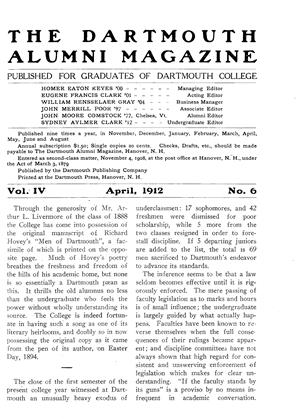of the class of 1888 the College has come into possession of the original manuscript of Richard Hovey's "Men of Dartmouth", a facsimile of which is printed on the opposite page. . Much of Hovey's poetry breathes the freshness and freedom of the hills of his academic home, but none is so essentially a Dartmouth psean as this. It thrills the old alumnus no less than the undergraduate who feels the power without wholly understanding its source. The College is indeed fortunate in having such a song as one of its literary heirlooms, and doubly so in now possessing the original copy as it came from the pen of its author, on Easter Day, 1894.
The close of the first semester of the present college year witnessed at Dartmouth an unusually heavy exodus of underclassmen: 17 sophomores, and 42 freshmen were dismissed for poor scholarship, while 5 more from the two classes resigned in order to forestall discipline. If 5 departing juniors are added to the list, the total is 69 men sacrificed to Dartmouth's endeavor to advance its standards.
The inference seems to be that a law seldom becomes effective until it is rigorously enforced. The' mere passing of faculty legislation as to marks and hours is of small influence; the undergraduate is largely guided by what actually happens. Faculties have been known to reverse themselves when the full consequences of their rulings became apparent; and discipline committees have not always shown that high regard for consistent and unswerving enforcement of legislation which makes for clear understanding. "If the faculty stands by its guns" is a proviso by no means infrequent in academic conversation. The undergraduate, then, can hardly be blamed if he reads a rule rather in the light of historical precedent than of literal interpretation. Yet the sooner he finds that historical precedent and literal interpretation lead to one and the same conclusion, the better for him and for his college. While THE MAGAZINE deplores the departure of so large a number of students as have recently been dismissed from Dartmouth, it nevertheless takes pride in the vigorous affirmation of principles which their going implies. It is unlikely that such inclusively drastic action will again be necessary. The full enforcement of the advanced requirements for graduation will undoubtedly cause some temporary disturbance among the upperclassmen. But it is safe to say that, if the same firmness is shown there as has been shown in dealing with sophomores and freshmen, the cause of higher standards will have been won and the student body will proceed to adjust its activities accordingly.
Dartmouth fraternities have achieved considerable prominence in the recent upheaval of opinion occasioned by the enforced departure from College of much prospective social and athletic material; for it seems that the majority of those whose poor scholarship resulted in dismissal were members of fraternities. In view of this fact, one of two unpleasant conclusions seems unavoidable: either the fraternities are exercising a damaging influence upon their younger members; or they are deliberately choosing poor intellectual material. Whichever of these conclusions is correct, it constitutes a serious indictment of our Greek letter societies. The democracy of Dartmouth has always maintained that no organization or institution within the student body should be allowed to exist, unless it contributed to the good of the College. Just what the fraternities are today contributing would be hard to say. There was a time when they provided the only opportunity for organized literary effort among the undergraduates. But their literary functions were long since taken over by the college publications and the college debating teams. Palaeopitus is a monument to their failure to appreciate their opportunities as guardians of tradition and moulders of public opinion. Their activities in undergraduate politics have'been productive mainly of ill-feeling and distrust. Once in the year, however, they are a source of pride:,they have made possible the Junior Prom. That in itself constitutes a fair reason for their being. It ought not to be the only one. Fraternities have, for more than half a century, been a part of the life of Dartmouth. It is hardly conceivable that their possibilities of usefulness have in that period been exhausted and that henceforth they are to be regarded as little else than ornamental parasites upon the life of the College.
On another page is printed a list of subscribers to the ALUMNI . MAGAZINE by classes. The list is revised to March 1, 1912, and shows a gain of 46 for the year. The total number of subscribers is 864, and there are in round numbers 5,000 living alumni. It is the aim of the editors to produce a magazine that shall reflect all the life of the College, administrative, graduate, and undergraduate. A glance at the numbers subscribing from the various classes will show that the magazine is reaching less than one-fifth of the alumni as regular subscribers. If it is to perform its mission with the greatest efficiency, the subscription list should be largely increased. A copy of this issue goes to every alumnus. Non-subscribers are asked to examine this number carefully, and if it gives satisfactory evidence that subscription may be a means of keeping in closer touch with the College and its life, to sign and return the enclosed blank. You will be helping THE MAGAZINE in so doing and also, we hope, quicken your own sense of the life and reality of Dartmouth.
Article
-
 Article
ArticleCelia Stone Hopkins
July 1950 -
 Article
ArticleAlumni Council's Leading Artist
January 1955 -
 Article
ArticleEnrollment
November 1953 By C. E. W. -
 Article
ArticleOHIO CANAL ERA, A CASE STUDY OF GOVERNMENT AND THE ECONOMY,
DECEMBER 1969 By JERE R. DANIELL II '55 -
 Article
ArticleDANIEL CROSBY GREENE
May 1920 By Philip Sanford Mar den '94 -
 Article
ArticleThayer School News
October 1937 By William P. Kimball '28










